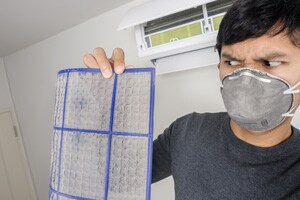
According to the Environmental Protection Agency, indoor air is up to five times more polluted than outdoor air. That makes sense, as indoor air is often stale and recirculated, with many modern buildings lacking the ability to open windows due to energy-saving designs. But that notion that indoor air is five times more polluted becomes a potentially grave risk, based on a recent report regarding pollution and life expectancies.

The report, conducted by the University of Chicago’s Energy Policy Institute, claims that air pollution in general can take more than two years off an individual’s lifespan or life expectancy. The institute’s Air Quality Life Index asserts that while activity, travel, and manufacturing was lessened during the global pandemic caused by COVID-19, the components of air pollution, like smoke, fumes, dust, and pollen, remained high.
Because the levels remained high (and in the US were exacerbated by increased wildfires), the report theorized that there’d be increased health risks. Already, the World Health Organization states that air pollution can lead to lung cancer, strokes, and heart attacks, so the index assessed potential damages and found air pollution reduces global life expectancies by 2.2 years. That’s more than the expectancy reductions caused by smoking cigarettes (1.9 years), alcohol consumption (8 months), and unsafe drinking water (7 months).

Since indoor air amplifies the threat, many facility managers have recently renewed efforts to boost indoor air quality in enclosed spaces. In particular, heavily trafficked areas, with many points of ingress and egress and diverse populations—like universities and community colleges—have prompted facilities managers to take steps to outfit existing HVAC systems with additional measures.
Ironically, that attention to boosting indoor air quality has resulted in long lead times from some manufacturers for components necessary to augment existing HVAC systems. Fortunately, however, DwyerOmega has a wide range of air quality monitors, gages, and sensors in stock and ready to ship, so facility managers can complete their indoor air quality projects in a timely fashion. For more information about DwyerOmega's IAQ products, please visit: https://www.DwyerOmega- inst.com/Product/AirQuality/

